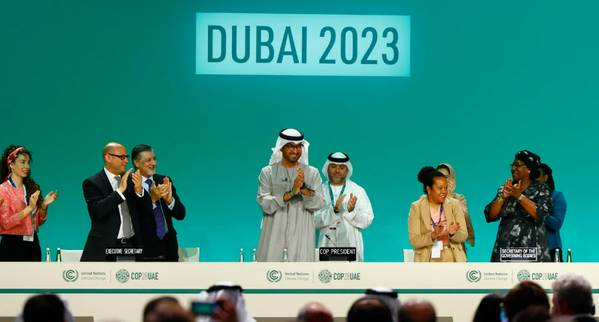
COP28 has concluded with agreement on a text named The UAE Consensus that aims to set out a climate agenda to keep 1.5°C within reach. The UAE Consensus calls on parties to transition away from fossil fuels to reach net zero, encourages them to submit economy-wide Nationally Determined Contributions, includes a new specific target to triple renewables and double energy efficiency by 2030, and builds momentum towards a new architecture for climate finance.
The UAE Consensus followed a year of inclusive diplomatic engagements and two weeks of intense negotiations. “The world needed to find a new way. By following our North Star, we have found that path,” said COP28 President, Dr. Sultan Al Jaber during his closing speech. “We have worked very hard to secure a better future for our people and our planet. We should be proud of our historic achievement.”
Major commitments contained in the final negotiated text include:
• An unprecedented reference to transitioning away from all fossil fuels to enable the world to reach net zero by 2050.
• A significant step forward in the expectations for the next round of Nationally Determined Contributions by encouraging “economy-wide emission reduction targets.”
• Building momentum behind the financial architecture reform agenda, recognizing the role of credit rating agencies for the first time, and calling for a scale up of concessional and grant finance.
• A new, specific target to triple renewables and double energy efficiency by 2030.
• Recognizing the need to significantly scale up adaptation finance beyond the doubling to meet urgent and evolving needs.
National Ocean Industries Association (NOIA) President Erik Milito issued the following statement on the non-binding pact:
"The goals set by COP28 underscore the pivotal role of the American offshore industry in achieving the objectives of mitigating climate change while enhancing global living conditions.
“As global energy demand continues to rise, the reality is the necessity for all energy sources to remain into the foreseeable future in order to effectively meet the energy security needs of a growing global society. The U.S. offshore region is uniquely situated to provide the energy sources Americans rely upon for a high quality of life, while also providing a roadmap for addressing emissions.
“The U.S. Gulf of Mexico stands out for consistently demonstrating the ability to produce oil and natural gas with lower greenhouse gas emission intensity than almost all other regions. Encouraging increased production in the Gulf of Mexico is not only in the national interest but also globally advantageous, preventing a shift to higher-emission sources to meet energy demands.
“Moreover, the rapid expansion of the American offshore wind sector and the advancements in offshore carbon sequestration provide potent tools to address global emissions. While the strategic benefits of U.S. offshore wind are widely acknowledged, the Gulf of Mexico presents substantial potential for offshore carbon sequestration.
“As recognized by global authorities, widespread adoption of carbon capture and storage is a key tool for achieving global climate change ambitions. The Gulf of Mexico, with its abundant geological prospects for carbon storage, well-established energy infrastructure, proximity to industrial centers for emissions capture, and a readily available engineering and energy knowledge base, stands as a key player in this effort. This technology has been proven globally but federal policy has delayed the U.S. build-out.
“An American-led energy transition offers vast advantages. It allows significant strides against climate change while ensuring global access to reliable, affordable, and responsible energy production and boosting our national security."